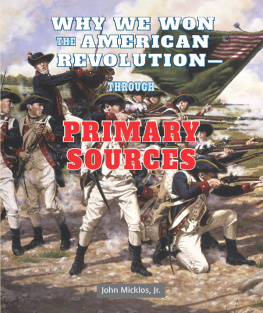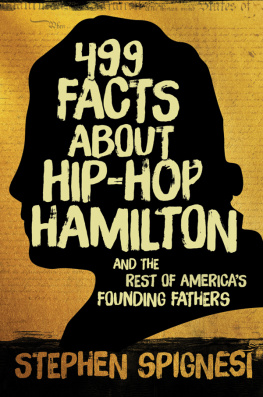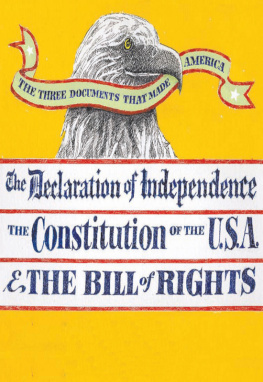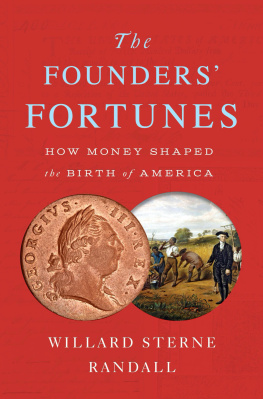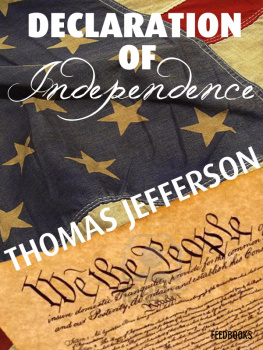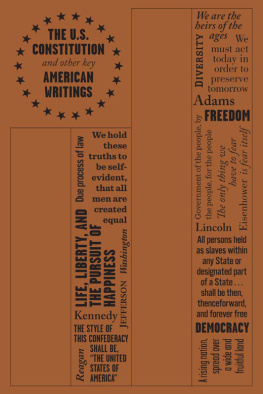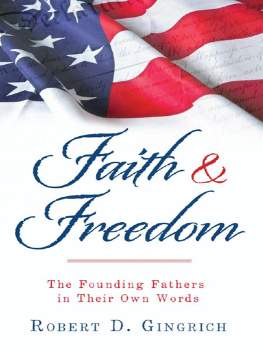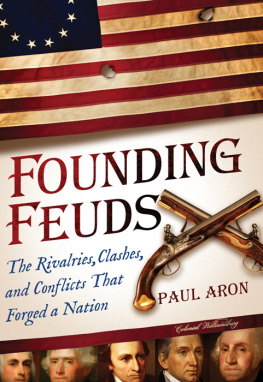FORGED IN
Faith
HOW FAITH SHAPED
the BIRTH of the NATION
1607-1776
FORGED IN
Faith
ROD GRAGG

 | Published by Howard Books, a division of Simon & Schuster, Inc.
1230 Avenue of the Americas, New York, NY 10020
www.SimonandSchuster.com. |
Forged in Faith 2010 by Rod Gragg
All rights reserved, including the right to reproduce this book or portions thereof in any form whatsoever. For information, address Howard Subsidiary Rights Department, 1230 Avenue of the Americas, New York, NY 10020.
In association with Lee Hough and the literary agency of Alive Communications
ISBN 978-1-4165-9629-5
ISBN 978-1-4391-6692-5 (ebook)
10 9 8 7 6 5 4 3 2 1
HOWARD and colophon are registered trademarks of Simon & Schuster, Inc.
Manufactured in the United States of America
For information regarding special discounts for bulk purchases,
please contact: Simon & Schuster Special Sales at 1-866-506-1949
or business@simonandschuster.com.
The Simon & Schuster Speakers Bureau can bring authors to
your live event. For more information or to book an event,
contact the Simon & Schuster Speakers Bureau at 1-866-248-3049
or visit our website at www.simonspeakers.com.
Edited by Between the Lines
Cover design by Faceout Studio
Interior design by Jaime Putorti
All Scripture quoted in this work is from the King James Version of the Bible.
For my wife, Cindy,
with love
O! Lord our heavenly Father, King of kings and Lord of lordslook down in mercy, we beseech thee; on these our American States who have fled to thee from the rod of the oppressor and thrown themselves upon thy gracious protection, desiring henceforth to be dependent only on thee
Official Prayer of the First Continental Congress,
September 7, 1774
Blessed is the nation whose God is the lord and the people whom he hath chosen for his own inheritance.
Psalm 33:12
CONTENTS

FORGED IN
Faith
INTRODUCTION

He was old nowwhite-headed and weather-facedbut his memories were rich. He had been present at creationat the birth of the nation. What scenes he had witnessed: Stamp Act protests, rousing debates in the Massachusetts legislature, ministers passionately preaching freedom from the pulpit, crowds crying, No taxation without representation!and tons of tea spreading like brown ink in Boston Harbor. He had almost been captured by British troops at Lexington in 1775, when the shots were fired that changed the world. He had served as a delegate to the Continental Congressas the most famous man there, by some estimates. He could remember the faces, the voices, the votes for independenceand the fresh, new appearance of the Declaration of Independence, which bore his signature.
He was Samuel Adams, and in March 1797 he was seventy-four years old. He had served God and the people almost his entire life, and he was not finished yet. Not quite. He had been a political writer, an agitator, a legislator, a signer of the Declaration of Independence, a United States congressman, a member of the Massachusetts convention that ratified the U.S. Constitution,
One of them was before him now. It was his responsibility as governor to issue an official proclamation for the commonwealth of Massachusetts. This was no frivolous public statement. It did not resemble future proclamations issued by governors to promote tourism, celebrate sports victories, or recognize beauty queens, state fairs, and cooking festivals. On March 20, 1797, founding father Samuel Adams, now governor of Massachusetts, issued an official state proclamation calling for a Day of Solemn Fasting and Prayer in Massachusetts.
It was not an unusual government action in eighteenth-century America: legislatures, governors, and the American Congress had officially called for days of thanksgiving and had set aside official days for prayer and fasting. On the designated days, normal activities ceased in most places. Businesses closed. Traffic disappeared. Countless Americans assembled in their churches. Ministers of the Gospel, the most respected professionals in America, led them in worship, confessing sins, giving thanks, and respectfully imploring the blessings of Almighty God.
Adams now did so again. With the advice and consent of the state legislature, he officially proclaimed that a day in May would be set aside throughout Massachusetts for the purpose of public fasting and prayer. On that day, Ministers of the Gospel, with their respected congregations were asked to assemble together and seriously consider, and with one united voice confess our past sins and transgressions, with holy resolutions, by the Grace of God, to turn our feet into the path of His LawHumbly beseeching Him to endue us with all the Christian spirit of Piety, Benevolence and the Love of our Country; and that in all our public deliberations we may be possessed of a
As governor, Adams also called on the people of Massachusetts to pray for the states businesses, its industry, its education system, for the other American states, and for the national government. And I do hereby recommend, he added, that all unnecessary labour and recreation may be suspended on the said day. The proclamation concluded with an official request that would undoubtedly seem startling to many in a distant, future America:
I concede that we cannot better express ourselves than by humbly supplicating the Supreme Ruler of the WorldThat the rod of tyrants may be broken into pieces, and the oppressed made FreeThat wars may cease in all the Earth, and that the confusions that are and have been among the Nations may be overruled for the promoting and speedily bringing on that holy and happy period, when the Kingdom of our Lord and Saviour Jesus Christ may be everywhere established, and all the people willingly bow to the Sceptre of Him who is the Prince of Peace.
By issuing such an official proclamation, were the governor and legislature of Massachusetts violating the United States Constitution? Not to their thinking. Samuel Adams had signed the Declaration of Independence and had voted to ratify the U.S. Constitution. Therefore, he not only understood the original intent of Americas founding documentshe had helped make them. So had many others in his day, and they too had crafted, assisted, or observed Fast Day proclamations such as the one Samuel Adams issued in 1797. For them, Americas foundation of faith was common knowledge, and they viewed American liberty as a legacy of the Judeo-Christian worldview. In their day, it was an accepted fact that American and English law were based on the Higher Law of the Bibleand so were Americas founding documents.
Some modern historians, such as the Jewish scholar Abraham Katsh, have labored mightily to preserve a record of Americas faith-based founding. Of the Declaration of Independence and the United States Constitution, Katsh wrote: there runs through these two prime instruments of American government the deeper meaning and higher purpose of a constant regard for principles and religious ideas, based on a profound sympathy with the Scriptures.... The historical record is clear: America was forged on faith. But is that foundational fact common knowledge in contemporary America? Or has it been cast aside amid the clutter of modern distractions? Or perhaps lost by the neglect of the disinterested?
Next page

